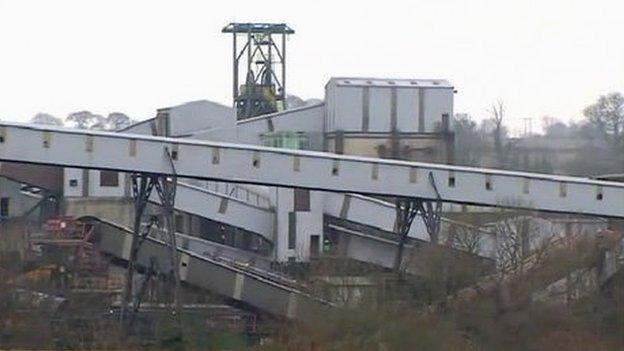Daw Mill colliery work 'will prevent fires'
- Published

The Coal Authority said there was no danger to local people or homes
The latest fire at the Daw Mill colliery in Warwickshire will be the last at the site, according to The Coal Authority.
Experts are currently working to backfill the shafts and cut off the oxygen supply to prevent further fires breaking out.
According to former miner and industry expert Dr Eric Wade, the fires at the Daw Mill site are due to the type of coal.
"Certain coals, including unfortunately Warwickshire thick coal, is liable to spontaneous combustion and that's been known since the 17th Century," he said.
Dr Wade, from Durham University said: "In part of Germany, for example, which has coal very similar to Warwickshire coal, there's been a fire underground for 300 years."
The Coal Authority, part of the Department for Energy and Climate Change, said the size of the seam was also a factor, with Daw Mill working the thickest coal seam in the country.
With 56 million tonnes of coal estimated to remain at Daw Mill, Dr Wade said the only way to tackle the current blaze was to starve it of air.
The Coal Authority said the latest work was due to be completed within two weeks and would see the two main shafts filled with limestone, followed by a clay plug.
Daw Mill is then expected to be capped with concrete by the end of the year - a move Dr Wade said would "stop it [fires] once and for all".
It also marks the final chapter for the mine which holds the UK record as producing the most coal in a year - some three million tonnes in 2008, a third of UK Coal's output.
Nuneaton MP Marcus Jones said he had held emergency meetings with The Coal Authority regarding the latest fire.
He said he had been assured it did not pose a danger to local people or property, partly due to the depth of the mine - some 700m (2,300ft).
- Published31 October 2013
- Published23 July 2013
- Published29 June 2013
- Published14 July 2013
- Published9 July 2013
- Published18 June 2013
- Published17 May 2013
- Published8 March 2013
- Published25 February 2013